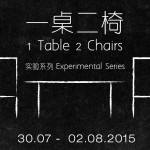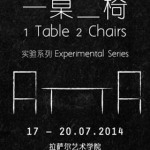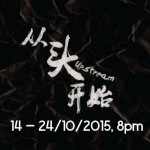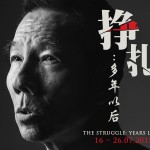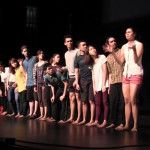“1 Table 2 Chairs”
Featuring:
Nothing (Ma Junfeng) &
Descendants of Eunuch Admiral – Was (Liu Xiaoyi)
Descendants of Eunuch Admiral – Is (Liu Xiaoyi)
Reviewer: Sam Kee
Performance: 31 July 2015
The concept of one-table-two-chairs is inspired by the traditional setting of a Beijing opera, in which various settings, ranging from a temple to a palace, can be depicted simply with these three pieces of furniture. This limitation appears restrictive but it also gives directors a free rein to express themselves and experiment with unfamiliar forms and structures.
Ma Junfeng does not seem too comfortable with a free rein though. He responds to this with a play titled Nothing and a rather cliché response, in my opinion. He borders a rectangular performance space with a thin red tape, where two performers take turns to enter and perform. Girl number 1 (Ng Mun Poh), bubbly and cheerful, explores her terrain, realising that she can burp pockets of air that floats and cut through the imaginary walls with her fingers to peer into the ‘outside world’. In contrast, Girl number 2 (Melissa Leung) seems to be always shouldering a huge boulder of ‘air’ with a solemn face. Not long after the girls accidentally stumble into each other’s alternate universe, they leave the demarcated space, and finally sit down opposite each other at the table. In the last few seconds before the lights go out, we see a symmetry – two seemingly opposites, staring into each other’s reflection. I reckon the piece cannot have found a better title, it literally was NOTHING much.
While Ma fumbles with ‘nothingness’ and ‘being’, Liu Xiaoyi deals with the dichotomy of past and present in an adaptation of Kuo Pao Kun’s Descendants of Eunuch Admiral, Zheng He. Zhao Yutao (who is due to perform only in the last play) enters to remove the red tapes, literally.
The play begins with a pre-recorded text from the original playscript, voiced by Liu himself, to set the story. In Was, we move through a flurry of abstract symbols characteristic of Liu, with Liu narrating the background information and voyages of Zheng He. Descendants is a play-text that engages many critical and pertinent issues: power, authority, duty, rootlessness and cultural limbo, to state a few. But I feel that Liu personalizes these issues with a decidedly humanist approach – centering his pieces on a reluctance to depart and a helplessness to affect change.
Another scene that leaves an impression is the juxtaposition of a Chinese performance tradition with an Indonesian soundtrack. Zhao performs a routine of stylized Kunqu Opera segment, clad in modern-day suit. It looks like he is dancing to the tune of an Indonesian folk song, Bengawan Solo. Despite the apparent disparity between the two, the juxtaposition works. Projected in the background, is text taken from a well-known Kunqu segment, 单刀会 (The Single-Knife Meeting of Guan Hanqing). Both text and soundtrack speak of a river that has flown eastward, never to return, exacerbating the melancholy & the helplessness.
As the light fades out, Zhao slowly turns his body around. He raises his finger at the audience, begging the question: Have you ever wondered if you might be a descendant of the Eunuch Admiral, Zheng He?
Do you have an opinion or comment about this post? Email us at info@centre42.sg.
ABOUT THE PRODUCTION
1 TABLE 2 CHAIRS EXPERIMENTAL SERIES by The Theatre Practice
30 July – 2 August 2015
Creative Cube @ LASALLE College of the Arts
ABOUT THE REVIEWER
Sam Kee is currently helming the literary and visual arts section at artsrepublic.sg while putting her major in Mathematics to good use at an educational publishing house.

